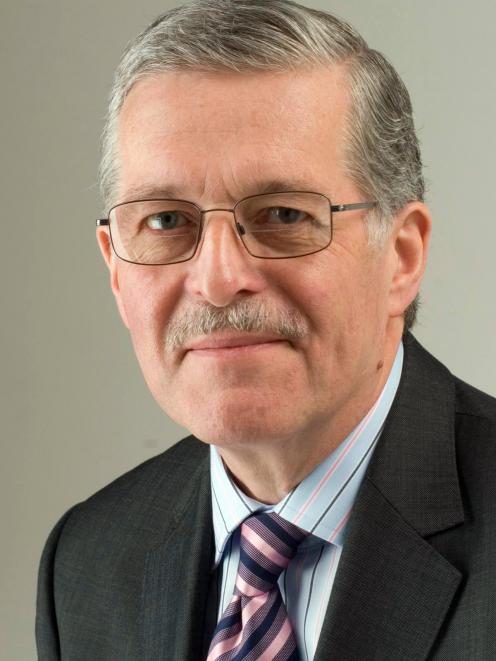The Government is saving a packet as New Zealanders turn to crowdfunding for timely and lifesaving health care. Or is it?
Bruce Munro examines the real cost of unmet health needs and delayed treatment.

He does not want to talk about money. Which is awkward. Because in the end, this is all about money.
George Munro* (78) sits on a couch in his sunny South Dunedin townhouse. In front of him is a steaming cup of tea and an assortment of home baking prepared by his wife, Pat.
It is obvious that he is debilitated. He cannot hide the crutches he needs to walk.
Nine months after first noticing his left hip was getting sore, Mr Munro can no longer cut the lawns, play bowls or work on his beloved Morris Minor.
But what is masked by Mr Munro's stoic facade is the terrible, constant pain emanating from his hip, shooting down through his groin into his leg.
As the arthritis has broken down the cushioning cartilage, the bones in his left hip joint have begun rubbing directly on each other.
He now struggles to get in and out of his house, his car, his chair.
He is waiting to get x-ray results that will help determine whether he qualifies for a hip replacement in the public health system.
''The points system is so high now, you virtually have to be a cripple to qualify,'' Mr Munro says.

But he does not want to talk about money, the option of getting the operation done privately, nor how much that would cost.
''I don't want to look like I'm on the beggar trail,'' he says firmly.
Leeanne Offwood did not want to be asking for help either. But she feels forced to by a health system she believes is failing her son.
A fortnight ago, the West Coast single mother started a givealittle page to raise $3500 for her 8-year-old who needs to have his tonsils and adenoids removed.

At present, Ms Offwood's son has year-round throat and sinus infections as well as sleep apnoea. The surgery would deal to that. But she has been told her options are an eight-month-plus wait for public health surgery or pay $3500 for more timely, private hospital care.
''Our health system is a joke,'' Ms Offwood wrote on the crowdfunding page she started for her son.
''I never thought I would be put in this position ... but my baby needs this, and as a mum ya got to do what you got to do.''
To date, 11 donors have given a total of $715 towards the cost of his private hospital treatment.
Ms Offwood's heartfelt plea for strangers' help is just one of 935 such pages on Spark Foundation's givealittle website.
Each has a title, a photo and a description of the need. The titles reflect the diversity of that need, ranging from ''Help Andrew beat the big C'' and ''Kicking MS in the nick of time'' to ''Life for my wife'' and ''Darren's brain tumour battle''.
Often, fundraising pages stay open for several months. In 2014, there were 1059 health-related, givealittle pages. Last year, that had more than doubled to 2448. This year is on target to be even higher.
It is a symptom of what doctors, economists and researchers say is New Zealand's massively underfunded health system.
Lyndon Keene, who represents the Association of Salaried Medical Specialists, and Bill Rosenberg, who is an economist for the New Zealand Council of Trade Unions, both say health is underfunded by more than $2 billion.

That shortfall is just one of a series of annual funding shortfalls, Mr Keene says. In order to make up those deficits and restore the country's health funding to 2010 levels, an additional $2.3 billion is needed next year, and matched in future years, he says.
The Government disagrees.
Minister of Health, Dr Jonathan Coleman, says health is the Government's top funding priority, receiving $15.23 billion this financial year. He asserts that health funding has kept ahead of demographic pressures and inflation and says next year's investment in health will be the biggest in nine years.
''Claims by government critics that health funding has been cut are incorrect,'' Dr Coleman says.
''It's an election year and these are government critics.''
Not so, replies Mr Rosenberg.
''Our analysis has been carried out annually since 2010, which he is well aware of,'' Mr Rosenberg says.
His and Mr Keene's claims of underfunding are backed up by a Treasury report on the financial state of district health boards, released in February. The report says health funding has not kept up with costs such as price increases and wages and is not enough to cover all the new health initiatives announced by the Government.
''In effect, new initiatives have been unfunded and the rest of the health system has been required to find the money,'' Mr Rosenberg says.
Mr Munro is well-placed to comment. The joint replacement he is waiting for will be his fifth.
Both knees were replaced in 2005. The left shoulder and right hip were done in 2014.
''Twelve years ago, it was a lot easier to get into the system ... Now, it's very frustrating,'' he says.
Each time he has had an operation it has made an enormous difference to his quality of life. ''I had to retire a couple of years earlier than planned because of my knees,'' the former sheetmetal worker turned high school property manager says.
''But after my knees were done, I was back to jogging around the grass. I'm forever grateful for that.''
He has nothing but praise for the doctors and nurses. The frustration lies in trying to get treatment in the first place, he says.
His experience is borne out by a Commonwealth Fund report comparing health systems in 11 countries. New Zealand ranks third on efficiency and fourth on quality of care. But we are seventh for access to services and in last place for health expenditure per capita.
''When you get into the system, it works for you,'' Mr Keene says.
''But actually accessing it, when you compare that with other countries, our access is not good; whether it's waiting lists or access to GPs or access to specialists or actually getting surgery done.''
Crowdfunding is a grassroots attempt to bridge that gap. It is an option of last resort for an increasing number of New Zealanders caught between an inordinate wait for treatment in the public health system and the exorbitant cost of quicker and better resourced private care.
On January 4, Angelik Fruean, of Auckland, started a givealittle page for her family member Te Aroha Isaia, a mother of two, who was diagnosed with aggressive breast cancer three days before Christmas.
An available drug treatment had a 50% chance of getting rid of the tumour. But another drug would increase that to 80%.
''Unfortunately this drug is not funded by the Government ... and will cost around $26,000,'' the page states.
''We need your help in any shape or form to fundraise for this drug and help with any other financial burden Mathew and TA might encounter.''
An update, posted on January 13, is a 20 second video of the couple's children giving thanks for donations and prayers.
To date, 264 people have donated a total of $16,111.10.
That is just one page. Add them all up and, during the past 12 months, thousands of individuals have pledged a total of $6,771,125.50 to the health needs of fellow New Zealanders.
Each givealittle health page is saving the Government a tidy packet.
Or is it?
Most sites don't have a stated fundraising goal. And those that do, raise on average only 17% of their target.
So what is the real cost? And not just the funding shortfall compared with previous years. What is the hidden cost of delayed treatment and unmet need?
In short, no-one really knows.
And that, in large part, is because the Government has made it difficult to calculate.
But evidence from overseas, combined with the partial picture available in New Zealand, reveals a disturbing scene and an urgent need for a new approach, say those at the sharp end and those trying to piece it together.
Realising there is a cost in not meeting care and delaying treatment ''is not rocket science'', Mr Keene says.
''If you require heart surgery and you have to wait a year for it, and that restricts your employment, there is a cost there, and a cost to you personally,'' he says.
There will also be regular visits to the GP, and possibly the hospital, for monitoring. There will be the cost of medication to manage your condition.
Then, eventually, when you get to have your operation, it is highly likely that your condition will have deteriorated. So, the operation will be more complex and more costly. Your rehabilitation could also be a little more complex.
''So delays have flow on effects that are very costly to yourself, the health system and the broader economy,'' Mr Keene explains.
''But much of this is not acknowledged in health funding debates. Partly because a lot of it is not well known.
''We look at the cost of the treatment and don't look at the cost of not doing the treatment.''

Dr Phil Bagshaw is chairman of the Canterbury Charity Hospital Trust. He has run a pilot study to find the best way of measuring unmet need in secondary (general hospital) health care.
That pilot study suggests almost a third of the adult population has an unmet primary healthcare need and almost 10% has an unmet need for hospital care.
Dr Bagshaw is now trying to get funding for a full-scale study. The $1.6 million price tag, however, is likely to put the Health Research Council off.
It is research the Government should be doing regularly, Dr Bagshaw says.
''But the Government doesn't don't want to know. Because there is so much [need] and they are responsible for it.
''Once they got rid of waiting lists, there was no measure of what's not being done.''
Waiting lists vanished in 1998, dissolved into the National Waiting Times Project. Anyone who could not be seen within the set timeframe was turned away with a ''Dear John'' letter returning them to their general practitioner (GP).
In essence, it let the Government ration resources, setting the bar on the basis of funding decisions rather than healthcare needs.
''Then they trumpeted saying they were reducing the waiting time from six months to four months, which just meant they reduced the number of people they saw by one third,'' Dr Bagshaw says.
''Things are getting decidedly worse, in fact troublingly worse.
''We used to have a universal access hospital care system that was the envy of the world. Since the health reforms of the 1990s, it has been stealthily eroded by successive governments. How far will this process have to go before someone points out that the king has no clothes?''
The impact of this rationing is evident in the Southern District Health Board.
Research by orthopaedic surgeon David Gwynne-Jones, published in the New Zealand Medical Journal last year, revealed how many Otago people were waited-listed for joint replacement but did not get surgery.
That number has risen from 75 people in 2012, to 190 people in each of 2014 and 2015. As a result, the health condition of the people qualifying for surgery is demonstrably worse.
This month, in a public letter to Dr Coleman, Mr Gwynne-Jones and fellow orthopaedic surgeon Simon McMahon said there were clinical staff throughout the SDHB who did not have enough resources to provide ''a satisfactory level of care''.
The pair warned the areas receiving recent publicity - intensive care, urology, and cardiac surgery - were the ''tip of the iceberg''.
Last week, asked how he felt about returning patients to GPs, Mr Gwynne Jones said, ''It's a total frustration for patients and surgeons and a waste of time for everyone.''
It is not just high value treatment delays that add to the cost.
Neil Murch resides in Southland and Dulcie Nel in Bay of Plenty. Both are living with deteriorating eyesight as they wait for cataract surgery.
Both have had givealittle pages started for them by their respective children.
Mr Murch has lost the sight in his left eye. Without surgery on his right eye, he is likely to be completely blind by Christmas.
''He has been waiting on the public health list for well over two years with no results,'' his daughter wrote on the givealittle page.
''Private surgery is looking like the only way to save the vision he has left.''
Three people have donated a total of $90.
Mrs Nel's daughter is trying to raise $5000 for cataract surgery for her mum. Mrs Nel qualified for government funding for one eye operation. But that improved her vision enough to disqualify her from getting the cataract removed from the other eye.
Since June, she has received three donations totalling $50.
The help they will both need if they lose their sight will be much more costly, to them and the Government, than the price of simple cataract surgery.
Overseas, there have been several studies looking at the cost of specific illnesses. But not many countries have done health system-wide studies.
Canada is one of the exceptions.
That country's Public Health Agency has carried out four studies quantifying the economic burden of illness. The most recent was published in 2014, for the period 2005 to 2008. It calculates the cost of hospital and doctor care, drug expenditure and the cost of lost production caused by illness, injury and premature death. The report found that in 2008 the estimated total economic cost of illness and injury in Canada was $192.8 billion.
That year, the Canadian government spent $121 billion on health, or 63% of the total cost.
Another piece of the puzzle comes from a 2007 Canadian study looking at the personal, government and economic cost of delays in various surgical procedures and MRI scans. It estimated the cost was $14.8 billion.
The clincher, though, is a study of 25 European countries that looked at the return on investment in health. Over a period of less than five years, for each dollar the government invests in health, it gets $5 in savings.
Even though there are no exact figures, we know the amount of unmet need and delayed treatment in New Zealand is substantial, Mr Keene says.
''We know it is costing a lot and that delays in treatment cost a lot.
''We don't know how much ... but that it is in the billions.
''If you pull all the national and international evidence together ... there is a very strong argument for investing more in health in order to save costs in the medium to long term.
''When we ask, can we afford not to? I would say absolutely not.''
Earlier this week, Mr Munro called with an update. The x-rays showed sufficient deterioration of his left hip to get him an appointment with a Dunedin hospital surgeon. In about four or five months.
That is not a date for the operation. It is an appointment to talk about it. Surgery could be eight months to a year away, he reckons.
* Not related to the author.













